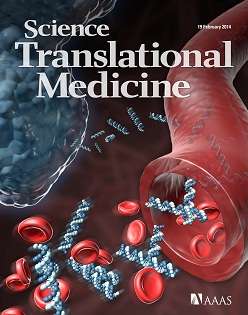DNA shed by tumors shows promise for non-invasive screening and prognosis

(Medical Xpress)—Certain fragments of DNA shed by tumors into the bloodstream can potentially be used to non-invasively screen for early-stage cancers, monitor responses to treatment and help explain why some cancers are resistant to therapies, according to results of an international study led by Johns Hopkins Kimmel Cancer Center investigators.
Analyzing blood samples from 640 patients with various cancers, the researchers used digital polymerase chain reaction-based technology (a sophisticated method of multiplying and measuring the number DNA molecules) to evaluate how well the DNA fragments predicted the presence of tumors in the patients.
The fragments, known as cell-free circulating tumor DNA (ctDNA), were detected in the blood of more than 75 percent of patients with advanced cancers and in at least half of patients with localized, smaller tumors that had not spread outside of the organ where the cancer originated and still had the potential for cure.
Investigators say the work, published Feb. 19 in the journal Science Translational Medicine, provides strong evidence that ctDNA could be used as a "personalized biomarker" test and cancer screening tool.
"We're already very good at treating and curing cancer when it is localized," says lead study author Chetan Bettegowda, M.D., Ph.D., an assistant professor of oncology and neurological surgery. "But we wanted to develop a non-invasive technology to enhance detection of cancer at an early stage, and we feel this is an exciting starting point for further work using this method."
"The most promising aspect is that ctDNA can identify early-stage cancers," adds one of the study's senior authors, Luis Diaz, M.D., associate professor of oncology and director of the Swim Across America Laboratory at Johns Hopkins.
Among study participants with metastatic cancers, researchers detected ctDNA in 82 percent of patients with solid tumors outside the brain (112 of 136 patients), including more than 75 percent of patients with advanced ovarian, colorectal, bladder, gastroesophageal, pancreatic, breast, hepatocellular, and head and neck cancers, as well as melanomas. Fewer than 50 percent of patients with medulloblastomas or metastatic cancers of the kidney, prostate or thyroid, and less than 10 percent of patients with gliomas, had detectable ctDNA.
Among 223 patients with localized tumors, researchers detected ctDNA in 55 percent of all patient samples, and in 73 percent of those with colorectal cancer, 57 percent of those with gastroesophageal cancer, 48 percent of those with pancreatic cancer and 50 percent of those with breast adenocarcinoma. Increasing levels of ctDNA correlated with the stage of cancer: 47 percent of patients with Stage I cancers of any type had detectable ctDNA, as did 55 percent of patients with Stage II cancers, 69 percent of patients with Stage III cancers, and 82 percent of patients with Stage IV cancers.
Comparing ctDNA with circulating tumor cells (CTCs), intact cells shed from a primary tumor that circulate in the bloodstream and may lead to metastasis, researchers found that ctDNA was often present in patients without detectable CTCs. They did not identify any cases in which CTCs were detected and ctDNA was absent.
The researchers also studied how accurately the test identified mutations in patients' tumors. They analyzed tumors and blood samples in a separate group of 206 patients with metastatic colorectal cancers, finding that ctDNA correctly identified 87 percent of patients with KRAS gene mutations, meaning that these patients' tumors may be susceptible to a therapy called epidermal growth factor receptor (EGFR) blockade.
In addition, investigators assessed whether ctDNA could provide clues to how cancers build resistance to EGFR blockade therapy in 24 patients who responded to therapy initially but later relapsed. They found that 23 (96 percent) of patients developed one or more mutations in genes involved in a signaling pathway called MAPK, which regulates gene expression and cell survival, among other tasks, and may help cancer cells thrive.
The study "provides a wealth of information on the potential utility and limitations of ctDNA measurements to assess patients with various cancers," the study authors wrote.
More information: "Detection of Circulating Tumor DNA in Early- and Late-Stage Human Malignancies," Chetan Bettegowda, et al. Sci Transl Med 19 February 2014: Vol. 6, Issue 224, p. 224ra24. DOI: 10.1126/scitranslmed.3007094















